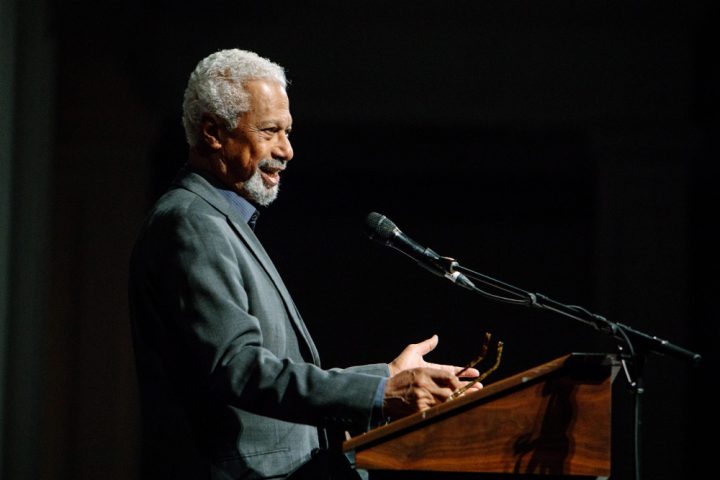
Introductions: Abdulrazak Gurnah
September 23, 2022
By Rebecca Hoogs, Executive Director
It is now my immense pleasure to introduce Professor Abdulrazak Gurnah. We are here tonight to celebrate Gurnah’s tenth novel, Afterlives, for which he won the Nobel Prize in Literature almost exactly one year ago today, as well as to honor his long career in literature. Gurnah’s books have been out of print in the United States for several decades, and thus many readers here, including myself, are just now discovering his works. The Nobel Prize committee commended his oeuvre for its “uncompromising and compassionate penetration of the effects of colonialism and the fate of the refugee in the gulf between cultures and continents.”
This gulf is one that Gurnah himself has experienced. Born in the Tanzanian archipelago of Zanzibar, he moved to England during the Zanzibar revolution at the age of eighteen. He taught at the University of Kent, where he is Professor Emeritus.
Afterlives is set in East Africa in the first half of the twentieth century when the region is under first German, and then British rule. “Gurnah’s bravura, beautifully calibrated novel,” wrote the Seattle Times, “encompasses the meld of cultures and languages in eastern Africa and the punishing legacy of European colonialism.”
Imbolo Mbue in the New York Times Book Review wrote that “[Gurnah] is a novelist nonpareil, a master of the art form who understands human failings in conflicts both political and intimate—and how these shortcomings create afflictions from which nations and individuals continue to suffer, needlessly, generation after generation.”
The book was, for me, both a sprawling history lesson and an intimate story of love, loss, and the ghosts that haunt us. It takes us across decades, showing us the traditions that bound women to the house or arranged marriages. It shows us how the rapid advances of the twentieth century, like travel, or a tape recorder, both separate loved ones, and bring us back to each other. It subtly suggests the power of writing, and books, and language, and music to heal us—or, at the very least, hold us. It also, in a week where we saw the celebration and critique of the monarchy as the Queen’s was put to rest and a new king took the throne, reminded me of the long spiral of colonialism.
In an interview last year year, Gurnah spoke about how his work has grappled with questions of displacement, exile, identity, and belonging. “There are different ways of experiencing belonging and unbelonging,” he said. “How do people perceive themselves as part of a community? How are some included and some excluded? Who does the community belong to?” These are questions at the very heart of SAL’s mission, part of the problem SAL is trying to solve. I can think of no better author, then, to begin this year’s Literary Arts Series than Abdulrazak Gurnah.
Rebecca Hoogs gave this introduction to open our 2022/23 Literary Arts Series event with Abdulrazak Gurnah on September 20, 2022. Tickets to view the recorded event are still available through Tuesday, September 27, 2022 at 7:30 p.m. (PT).